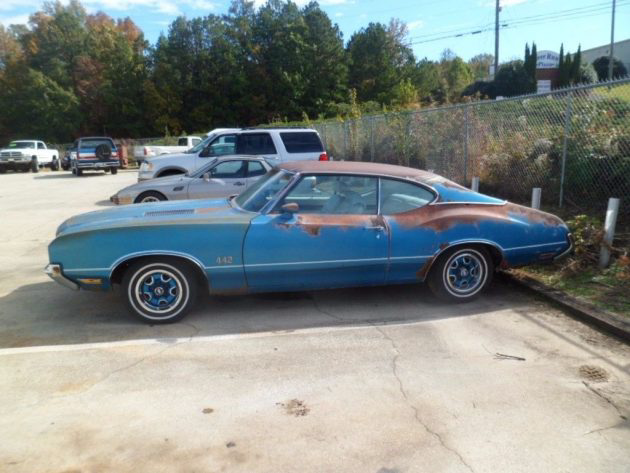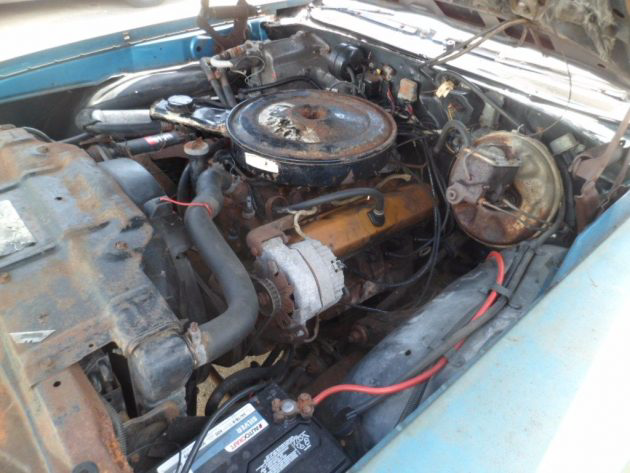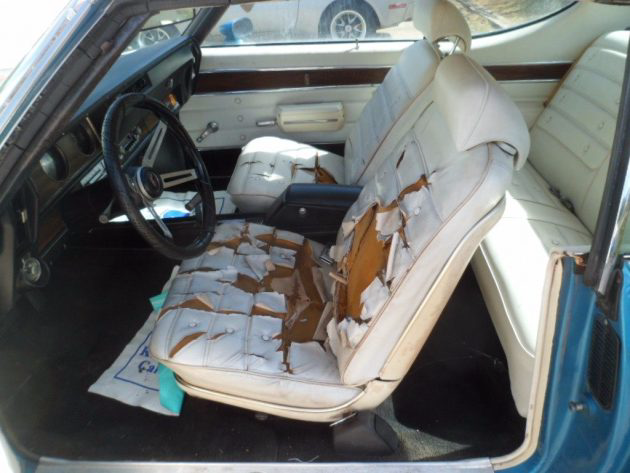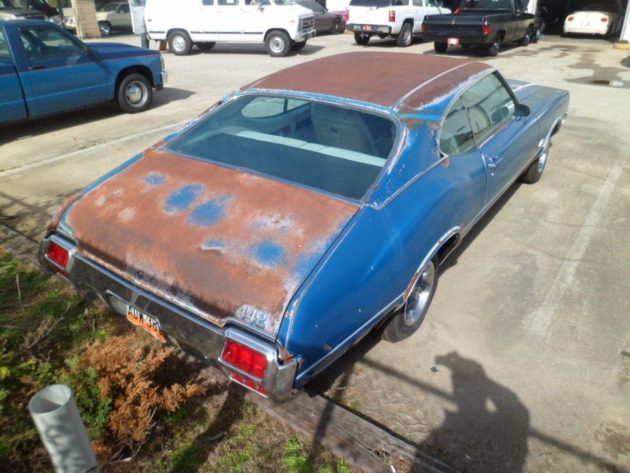From here, this Cutlass doesn’t look too bad! Unfortunately, this cool blue cruiser has a serious case of tin worm and will need lots of sheet metal. There is no doubt that this car was a looker when it was new! I’m biased because I love blue cars, but the full blue body with the color-matched wheels really looks fantastic on this car. I wonder what color the vinyl top was? Regardless, it was responsible for advanced rust around the windows. The seller, a dealership, states that “This car was sold to us and represented as a 442,” and essentially says that while it appears to be a 442, there is no formal documentation and they are not representing it as such. Find it here on eBay in Georgia with bidding at $4,000 and reserve not met.
This Cutlass is equipped with an Oldsmobile 350 Rocket V8, and not the larger 455 often found in 442s. From the ad, “You could still get a 350 Rocket Engine and still have the 442 package or you could have gotten it with the 455 engine in which case the exhaust would have exited thru the holes cut out in the bumper but that was only done with the 455 Engine which this car does not have.” Regardless, this car runs! It may or may not be a 442, but it is a 1972 Cutlass with a running engine, which certainly counts for something.
The interior is all but shredded, likely a combination of age and wear. This car has clearly been ridden hard and put away wet, but at least whoever owned it was enjoying it! The interior looks completely original and at a minimum everything but the back seat and door panels will need to be replaced or recovered including the headliner. This car really would have caught my eye when new with the white interior wrapped in blue paint!
All of the 442 badging looks old and original to me, but I am not a GM expert. If this car was cloned, it was done a long time ago. The seller states, “I have the original Georgia title and original sales agreement where the car was bought new in Atlanta, Ga at Mitchell Motors,” but also mentions it was delivered as a Cutlass S, and not a 442. Whichever it is, this car is a striking color combination and will make a fine classic ride once it is restored!








I believe that in 1972 the 442 was an option and not it’s own model anymore.
Simple run of the vin number will tell you everything. In 72 a W29 package was offered and was more of a 442 appearance package with 442 hood, 442 body striping etc.
By 1972, the 442 was an option package, available on any two door Cutlass. When ordered, it added stiffer springs and shocks, the “louvered” hood, a black grill, “442” badges and hood and body side stripes. That car has all of those features, and the Hurst “His and Hers” shifter, which I’m sure was only available with the 442 package.
Those 70-72 Cutlass’ were good looking cars, and I bet that one was no exception. It’s a shame the rust is so bad on that car. As a 455, or even a 350 with W30 (the ram air, fiberglass hood), it might be worth the time and money to restore, but as a “basic” 442, with a 350 automatic, I’m not so sure.
I don’t see why somebody couldn’t have ordered the his and hers shifter on a Cutlass.
A lot of the cars back then were special ordered, so I think it was possible.
What I was going to say but am slow. 1971 was the last year for vin specific specific letter codes (to fool the insurance companies no doubt) .
Was the same on the GTO which by that time was a trim only option. Neat car and am in agreement. By the time the 72’s rolled out they were warmed over ’71’s with minimal (if any) performance. Being a base car I think the seller should loose the reserve and happily take the money and run. Still lots of work to do here.
Wouldn’t the 442 have had a gauge package?
Tail lights look like 71
Dollars to donuts that vinyl top was white.
If it were repaired with all the rust cut out and new metal put in, followed by a coat of body filler it would be considered a bondo bucket. If it is left as is it seem patina these days is much more desirable. I personally would rather have the new metal and body filler. Some guys are true artists at it and could turn this car into a true jewel. As for making a profit restoring an old car, rarely is it profitable most people do it to have a fine vintage car. I find it interesting if we see a restored car like the red imperial on here it is picked apart, if we see this car and its rust its picked apart. It seem that most people are happiest when they are criticizing what is presented. Seems to me if your happy with your purchase, and restoring it then it’s a good deal if your happy with the end result no matter the cost.
The Imperial is not a restored car. It is a fixed and changed car. The color was changed, and not very well, and he added the parts on the roof.
It gets picked apart because it is not a nice job or was even necessary.
Thank you for stating what so many self proclaimed “car Guys” say about most project/restoration cars. True car people who appreciate certain years/models understand it’s not about an investment so much as a love for the car/truck. All the old car websites and forums are filled with haters who don’t support a person who wants to spend the time and money restoring certain cars because they are in pretty sad condition. Sure, it’s easier to buy one all restored already or even original and in great condition, providing you have the huge bank account to do so, but I say those are left for investors and others who just want to drive around and/or look at the car sitting in their garage and tell people about their latest purchase or investment. There are real car people and then the others.
Needs major exterior work and the interior needs a clean up. But I have no trouble with the rest of he car.
It is possible that it is a 442 keeping in mind that in 1972 the 442 was mainly a trim package.
According to 442.com:
1972:
Authentication:
’71-’72 fenders have bumps every several inches or so, on the inner edge where the hood sits. Whereas, original 1970 fenders will be flat.
Special striping on hood, trunk (deleted on trunk if W-35 spoiler added), and sides.
442 exterior-only badging (Cutlass plate was on glovebox). Special grill.
With the 455, you got the cutout bumper and dual exhausts and chrome tips. The cutout bumper could be added to the 350 CID 442.
For a 442 convertible only, the interior emblem should be “Cutlass Supreme”, not “442”, as it was based on the Supreme body style.
GA heads, with automatics getting the 1.998″ intakes valves and 1.685″ exhaust valves. Manual transmissions came with the 2.072″ intake and 1.625″ exhaust valves.
442 was now an option package. It was not a performance option, but handling and trim. Code W-29 was the 4-4-2. Unlike previous years, you could check the vin to determine if a car was a 4-4-2 or Cutlass, but in 72 the 4-4-2 went back to an option. The only way in 72 to tell by the vin if you had a 4-4-2 was if it contained an X for the engine which designated the W-30 package, which by default gave you the 4-4-2.
There were only minor external appearance changes from 1971. 1972 marked the end of 442’s with big blocks as standard. The 350 engine was now an option. The W-25 OAI fiberglass hood was optional on all Cutlass variations. All 1972 4-4-2’s are the W-29 option (regardless of engine size).
The notchback (“57”) body style was only used on the Supreme and the 72 H/O. If you’ve seen one with 442 emblems, they were not factory installed. Unfortunately, since the 442 reverted to an option package in 1972, there is not a unique 442 VIN. The W-29 442 package was only available on four models that year, the Cutlass sport coupe, two holiday coupes (Cutlass and Cutlass S, I believe), and the Supreme convert. Note, however, that there were notchback bodies made with the W-30 motor in 1972, as this was optional on the H/O. As a result, you could have a notchback VIN with an “X” engine code in 72.
The 442 trim package was available on the Cutlass (350 2bbl), Cutlass S (350 2 bbl), and Cutlass Supreme (convertible only, 350 4 bbl). The Cutlass and Cutlass S could be ordered with the L34 engine (350 4bbl), and all of them could be ordered with the L75 engine (455 4bbl). If you got a automatic trans with any of these you got 2.73 gears standard. You could order 3.08 or 3.23 gears with any of the engines with an automatic. If you had a manual trans you got 3.23 gears, period. The exception is if you got a W-30, in which case the gears were 3.42 (auto or manual) with 3.73 optional (auto or manual).
The OAI hood was a separate option, and the notched bumper came standard with the 455 motor. All small block cars came without notched bumper unless specifically ordered. BTW, there was no additional cost when ordering different gears. The 70-72 442 wings were fiberglass, not aluminum.
Although the 4-4-2 models have been removed from the 1972 model lineup, any Cutlass or Cutlass S Coupe, or Cutlass Supreme Convertible can look or act a sporty and the 4-4-2 ever did. And there are three distinctive optional packages to do the job.
The first available package is the 4-4-2 Appearance and Handling Package (W29). This package is available with any engine, and comes equipped with the Hursh Shifter, special hood, body-side and deck-lid striping, 4-4-2 radiator grilles, emblems and black hood louvers. It also includes heavy-duty Rallye Suspension Package (FE2), which gives it the firm ride a buyer would expect of a car that looks like this.
Rallye Suspension Package (FE2)
Heavy-Duty Front and Rear Springs
Heavy-Duty Front and Rear Stabilizer Bars
Heavy-Duty Front and Rear Shock Absorbers
Heavy-Duty Rear-Suspension Control Arms
14 x 7″ Wheels
The Rallye Suspension Package (FE2) is a duplicate of the former well-proven 4-4-2 suspension system. It includes the same heavy-duty components, which give these cars similar performance characteristics. This was a 442 option only.
Availability: Available for Cutlass and Cutlass S Coupes and Cutlass Supreme Convertible. May be used with Super Stock Wheels (N66, N67, or P05). Not available with Firm-Ride Shock Absorbers (FG2), Superlift Rear Shock Absorbers (G66), Heavy-Duty Suspension, (F41), or Heavy-Duty Wheels (N99)
W29 4-4-2 Appearance and Handling Package. Includes Body-side and Deck-lid striping. 4-4-2 Radiator Grille, Black Hood Louvers and Grille and Deck-lid numerals, plus options FE2 (Rallye Suspension Package), and Y73 (Hood Paint Stripe Decal). W39 (Hurst Shifter, 3-Speed Floor, Performance) included with Standard Synchromesh Transmission. Available with any engine. Required with W30 (Performance Package). N.A. with B84 (Protective Side Moldings with Black Vinyl Insert), or Y70 (Body-Side Paint Stripe), and J50 (Pedal-Ease Power Brakes) with L75 (Rocket 455 V-8 Engine with 4-bbl. carburetor).
With W39………$70.00
Without W39……$29.00
Both of these pieces of literature offer a lot of information that won’t be found in the standard sales catalog, but they can both be expensive to obtain. ’72 Dealer Albums can be hard to find, because Olds told it’s dealer to throw the pages away and re-use the binder for their ’73 information.
It turns out that the “colonnade” styling from 1973 was originally intended to be released for the 1972 model year. A strike at GM forced the delay of those cars and the stretch of the 1971 cars to cover 1972. If you look closely, there is very little difference between the 1971 and 1972 A-bodies. The 442 grilles, for example, are identical, with the only difference being the 1971’s are painted black and the 1972’s are silver. Similarly, the tail light lenses are also the same, with the exception that the 1971’s are solid and the 1972’s have bars dividing each lens into three parts. Bumpers in both cases are identical, as are hoods.
Model Units
Cutlass Hardtop 751
Cutlass S Sports Coupe 123
Cutlass S Hardtop 7800
Cutlass Supreme Convertible 1041
Total 9715
Engine/Model Usage
Engine Model Units
L32/L34 Coupe/Hardtop 8015
Convertible 1058
Total 9073
W-30 Coupe/Hardtop 659
Convertible 113
Total 772
Transmission/Model Usage
Trans Model Units
3spd Coupe/Hardtop 240
Convertible 15
Total 255
4spd Coupe/Hardtop 1121
Convertible 131
Total 1252
Auto Coupe/Hardtop 7313
Convertible 1025
Total 8338
Engine Specs:
In 1972 the VIN will indicate engine size:
Code H is the base 350 2-bbl single exhaust.
Code J is 350 2-bbl dual exhaust.
Code K is 350 4-bbl single exhaust.
Code M is 350 4-bbl dual exhaust.
L32: 350cu in, 2-bbl rochester, 8.50 CR, 160 hp@4000rpm, 275 ft/lbs torque@2400rpm (base engine)
L34: 350cu in, 4-bbl rochester, 8.50 CR, 180 hp@4000rpm, 275ft/lbs torque@2800rpm
W-30: 455cu in, 4-bbl rochester, 8.50 CR, 300 hp@4400rpm, 410ft/lbs torque@3200rpm
L75: 455cu in, 4-bbl rochester, 8.50 CR, 270 hp@4400rpm, 370ft/lbs torque@3200rpm
Transmissions:
3 spd manual column (c)
4 spd manual floor
3 spd TH-350 auto (a,c)
3 spd TH-400 auto (b,c)
a = only 350 CID engines
b = only 455 CID engines
c = available with console at extra cost
Rear Axles:
Standard:
3.23 Turbo Hydra-Matics
3.23 3-spd manual
3.42 4-spd manual
Performance Data:
No data.
[ Thanks to Jason Labay, Mike Rothe, Joe Padavano, Paul Hartlieb, Chris Smetana for this information ]
So, without the original build sheet it is impossible to tell in 1972 unless it came with the W30 option, that would nail it as a 442.
Thanks for all the facts Jim in Alabama. It would of took me a 6-pack to write all that.
I had a 1972 with ram air lock down hood 442 grill and Hurst 4 speed, whit stripes on the side and hood and trunk. White and black int and the tack. The only thing is some one liked it more then i.. Is there a tack in this one? That don’t look like a ram air set up to me. I for get what number or letter on the title will tell you if it’s a 442. Buy if you run across mine out there i still have the keys and title.